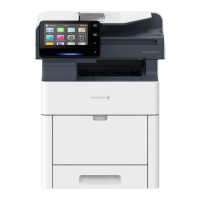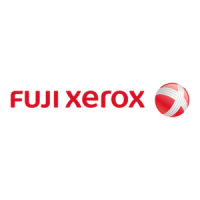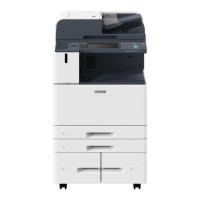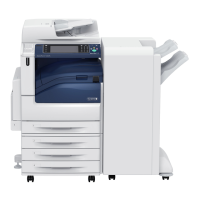
Do you have a question about the Fuji Xerox ApeosPort-VII C4421 and is the answer not in the manual?
| Functions | Print, Copy, Scan, Fax |
|---|---|
| Print Resolution | 1200 x 2400 dpi |
| Connectivity | Ethernet 1000BASE-T / 100BASE-TX / 10BASE-T, USB3.0, Wireless LAN (IEEE 802.11 a/b/g/n/ac) |
| Duplex Printing | Yes |
| Memory (Standard) | 4 GB |
| Hard Disk Drive | 250 GB |
| Type | Color Multifunction Printer |
| Max Paper Size | A3 |
| Paper Size | A4, A5, B5, Legal, Letter |
| Paper Input Capacity (Standard) | 1100 sheets |
| PDL | PCL6, PostScript |
Introductory text for the user guide.
Crucial security measures to protect the device and data.
Identifies and describes the main parts of the device.
Overview of the device's control panel, including touch screen and buttons.
Instructions on switching the device on and off, including remote operation.
Details on connecting the device using Ethernet and USB interfaces.
Guide for installing necessary software on Windows computers.
Explains Wi-Fi Connection and Wi-Fi Direct Connection methods.
Procedures for connecting to a telephone line and setting up fax features.
Configuration steps for Scan to Folder, Scan to USB, and Scan to Desktop.
Explains the device's power-saving modes to reduce consumption.
Overview of the touch screen interface and its basic functions.
Procedures for logging into the device using touch screen or IC card.
How to customize the Home screen and feature list display.
Creating and managing one-touch apps for frequently used operations.
Guidance on loading various types of paper into the device.
Procedures for loading originals into the document feeder and on the document glass.
Provides an overview of available print features on the device.
Instructions on printing documents from a computer using various methods.
How to print stored print jobs like Sample Set, Delayed Print, and Secure Print.
Procedures for printing files directly from a USB memory device.
Information on printing from mobile devices and via AirPrint, Google Cloud Print, and Mopria.
Step-by-step guide for performing basic copying tasks.
Describes how to cancel, interrupt, or manage ongoing copying jobs.
Instructions for copying both sides of an ID card onto a single sheet of paper.
Setting the copy ratio for reduction or enlargement of documents.
Step-by-step guide for performing basic fax operations.
Detailed instructions for sending and receiving faxes via the Internet.
Instructions for sending fax documents directly from a computer using a fax driver.
Information on Auto Receive and Manual Receive modes for faxes.
Procedures for resending or deleting faxes that failed to deliver.
Procedures for scanning documents and saving them to a folder on the device.
Instructions for scanning documents and sending them as email attachments.
Saving scanned data to a USB memory device.
Scanning originals and saving data to a computer via the network.
Importing files from a device's folder to a computer using TWAIN or DocuWorks.
Configuring password protection for PDF files to prevent unauthorized access.
Setting the color space for scanned images.
Procedures for creating private or public folders to store documents.
Checking, printing, or sending files stored in a folder.
Steps to delete folders and their contents.
Explains Job Flow as a feature to register and execute procedures for jobs.
Creating job flow sheets that are triggered by files stored in folders.
Manually initiating job flows by selecting both a file and a job flow sheet.
Adding frequently used addresses for Email, Fax, or Scan services.
Configuring detailed information for recipients, such as custom attributes.
Importing address information in CSV format using CentreWare Internet Services.
Overview of the Jobs app for checking job status and managing jobs.
How to view the status of jobs being executed, waiting, or completed.
Steps to cancel active or pending jobs.
Explains menus for changing device settings and checking details.
Checking device information, printing reports, and job history.
Checking and configuring paper tray settings, including paper type and priority.
Explains items to control device operation, mainly set by system administrator.
Configuring system clock, timers, power saving, and audio tones.
Configuring Low Power mode, Sleep mode, and Scheduled Power Off.
Configuring network interfaces, protocols, and IP settings.
Encrypting communication between server and device using SSL/TLS.
Configuring S/MIME settings for email encryption and digital signatures.
Encrypting network communication using IPsec for secure communication.
Configuring IEEE 802.1X authentication settings.
Explains the use of certificates for Encryption and Signature features.
Lists the types of digital certificates that can be used with the device.
Details on encrypting HTTP communications using SSL/TLS and IPsec.
Using S/MIME for email encryption and digital signatures.
Settings for sending scanned documents with digital signatures.
Explains how authentication restricts access, restricts service usage, and counts services per user.
Explains local accounts, remote accounts, and authentication methods.
Describes Local Accounting, Network Accounting, and Xerox Standard Accounting.
Details how services are restricted and accounted for based on authentication and accounting types.
Steps to register users, set authentication methods, and access controls.
Registering users as local accounts for management authorization and service restrictions.
Registering remote authentication servers like LDAP or Azure Active Directory.
Configuring accounting types, such as local or network accounting.
Procedures for authenticating login users and changing passwords.
Guidance on replacing consumables like toner cartridges and waste toner containers.
Step-by-step instructions for replacing toner cartridges.
Procedures for replacing the waste toner container.
Instructions for replacing drum cartridges when prompted.
Procedures for cleaning the exterior, interior, and touch screen of the device.
Cleaning color-density sensors to fix print or color density problems.
Instructions for cleaning the touch screen to maintain its responsiveness.
Procedures for cleaning the document cover and glass for clear copies.
Maintaining document feeder rollers for smooth paper feeding.
Automatically calibrating colors to maintain print quality.
Manually adjusting image position to correct misaligned output.
General guidance on identifying and resolving device issues.
Troubleshooting common issues related to device power, status LEDs, and touch screen.
Diagnosing and fixing issues related to copy image quality, such as smudges or lines.
Solutions for problems encountered during copying, like originals not feeding or incorrect results.
Troubleshooting common printing problems, including data transmission and print results.
Diagnosing and resolving issues related to sending and receiving faxes.
Addressing problems related to scanning, importing, and sending scanned documents.
Troubleshooting issues related to network connectivity and TCP/IP.
Troubleshooting issues with Email Notification, Print Email, Email service, and Internet Fax.
Procedures for clearing paper jams in various trays and units.
Procedures for clearing jams in the document feeder.
Information on error messages and codes, and how to resolve them.
Information about optional components available for the device.
Step-by-step guide for installing and removing the Wireless LAN Kit.
Procedures for installing optional storage devices.
Instructions for installing the A4 FAX LOW KIT optional component.
Detailed technical specifications of the device.
Details about the print function, including type, speed, and resolution.
Specifications related to the scanning capabilities of the device.
Details on fax transmission, recording paper size, and applicable lines.
Specifications for the automatic document feeder, including original size and paper weight.
Information on the standard and extended printable areas of the device.
Explains printer languages and emulation modes supported by the device.
Settings and features specific to ESC/P emulation mode.
Settings and features related to PCL emulation mode.
Information on HP-GL/2 emulation, including factory defaults and settings.
Explains the Auto Layout function for HP-GL/2 data to fit paper size.
Explains how the device determines paper size based on settings and loaded paper.
Describes how the scaling ratio is determined when auto scaling is used.











